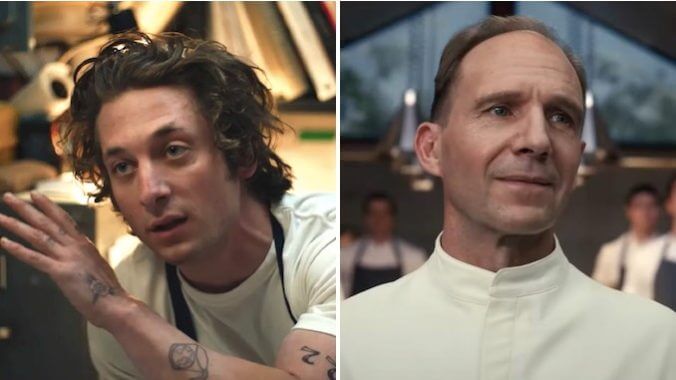The Bear, The Menu, and Where Creative Crossroads Take Us
Photo Courtesy of FX / Searchlight
A toast, dear readers, to the year of “Yes, chef!” Audiences hungry for crispy-seared drama devoured not one, but two tremendous achievements in food-based entertainment. Christopher Storer’s The Bear became one of FX’s buzziest 2022 programs based on its Chicago beef sandwiches, and Mark Mylod’s The Menu earned praise as a charred-black Michelin star satire. At their core are two head chefs—Jeremy Allen White as ex-Noma commander Carmen “Carmy” Berzatto and Ralph Fiennes as frustrated celebrity chef Julian Slowik—who battle the same creative-type demons that plague those who chose an existence of continual creation. The storytellers analyze the duo’s need for perfection, an endless cycle that eats away insides, and how it can be the literal or figurative death of overwhelmed creatives.
“Tortured Artist” stereotypes have existed since the inception of egos and the romanticism of creative professions. “Great art comes from great pain,” proclaims author Christopher Zara in his biographical collection about tormented creators aptly titled Tortured Artists. To me, there’s no better universal representation of the division between passion and obsession than media about culinary artists—chefs who conceptualize and execute exquisite dishes to be consumed seconds later by patrons who can deliver immediate feedback. The canvas is a plate, edible ingredients are their tools, and restaurants a representation of themes and metaphors from menu flow to quality standards. It’s the purest art form, with the gravest consequences, which always makes for compelling drama when the spotlight is cast on the caliber person and psyche it takes to wear a chef’s coat.
The Bear and The Menu are ultimately about kitchen heavyweights at their wit’s end, trying to rediscover their love of craft once more. Carmy abandons New York City’s fine dining scene to run his family’s greasy spoon Italian beef joint after his brother commits suicide, and is still plagued by memories of his abusive old executive chef (played with the utmost assholishness by Joel McHale). Julian organizes the most radical, boundary-pushing dinner service at his elite private island Hawthorne restaurant to prove he has one last showstopper in the chamber. They’re juggernauts of industry who’ve lost the passion that once stemmed from cooking, like many creatives who choose careers that require constant innovation, ingenuity, and it-factor appeal. These are men looking over a cliff’s edge, clinging to a branch that’s barely still connected to the ground.
On the surface, clear differentiation stems from the intention of each project. The Bear uses the chaos of unregulated kitchens to address the painful ripples of addiction and the complicated messiness of familial love. The Menu is a sickly comedic exploration of the toxic relationship between art, artist, and consumer. The Bear exists as a character study about an anxious chef finding himself in the hometown he fled, while The Menu is a double-edged commentary on those who drive creatives to despise the thing that once bred unparalleled happiness. Carmy and Julian reach crossroads as creatives with their backs against separate walls—a pivotal moment of either no return or retribution.
The Bear opts for a sweeter, cuss-filled reclamation for Carmy. Throughout the season, we learn about his strained relationship with brother Michael (Jon Bernthal makes some mean braciole) and desire to fix “The Beef” (the family’s restaurant) as a substitute for his sibling’s lost relationship. Carmy confesses to enjoying his morning pukes before Noma shifts because that’s the disgusting level of masochistic sacrifice we convince ourselves is required to get ahead as creatives. Punishment is a badge of honor as McHale’s malicious mentor breaks Carmy’s will until he starts reconnecting with his dysfunctional brigade at The Beef. The downgraded sandwich slinger learns hard lessons about fulfillment, self-preservation, and the loneliness of being at the top—but he extinguishes those proverbial flames that could burn the rest of his life down.